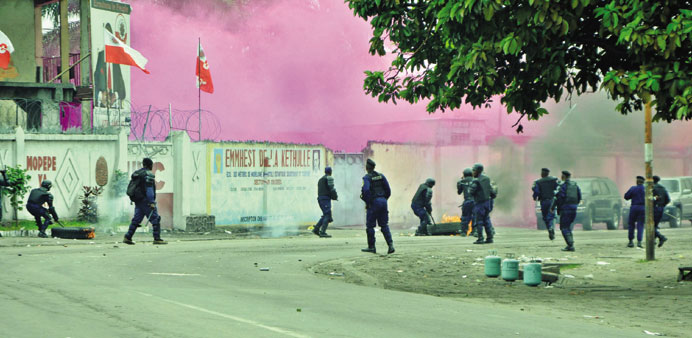
403
Sorry!!
Error! We're sorry, but the page you were looking for doesn't exist.
Kinshasa poll law protest broken up with tear gas
(MENAFN- Gulf Times) Police in the Democratic Republic of Congo's capital Kinshasa used tear gas yesterday to disperse more than 300 people protesting against a new electoral law before parliament.
The main opposition parties issued the call for the rally as parliament prepared to debate the legislation. They believe that the real aim of the new measures is to keep President Joseph Kabila in power after his mandate expires in 2016.
Kabila's regime seeks to make the staging of the presidential and parliamentary elections, which must be held by the end of 2016, contingent on the outcome of a census planned to start this year in the vast central African country.
This would postpone the polls by at least two years and keep Kabila in office for more than 15 years, according both to the opposition and to regional analysts.
About 30 riot police fired tear-gas canisters into the crowd at around 11.40am, forcing demonstrators to run for shelter in the offices of opposition parties near the parliament building, AFP correspondents witnessed.
Clashes broke out at midday in front of the headquarters of the Union for the Congolese Nation (UNC). Youths set tyres ablaze and police responded with more tear gas aimed at them and inside the premises of the third largest opposition party.
Shortly afterwards, Kinshasa's police chief, General Celestin Kanyama, arrived on the scene accompanied by police reinforcements packed into about a dozen jeeps.
Parliament, known as the People's Palace, was cordoned off by security forces ahead of the start of the debate set to start in the afternoon on the proposal to change the electoral law presented by the government a week earlier.
Kabila, a former soldier, was catapulted into office in January 2001, aged only 29, after the murder of his father Laurent Kabila, a longtime rebel who ousted the dictator Mobutu Sese Seko in 1997.
After two devastating wars that officially ended in 2003, a huge UN mission helped to organise the country's first free democratic elections in 2006. Joseph Kabila won the presidential poll widely commended as free and fair.
But his second and last five-year term began in 2011 after an election marred by violence and claims of fraud. The results were challenged by his rivals and international observers including the Carter Centre.
Several regional analysts and diplomats estimate that it would take up to three years to undertake a reliable census in a nation two-thirds the size of Western Europe, still gripped by serious unrest in the east and lacking vital infrastructure.
The main opposition parties issued the call for the rally as parliament prepared to debate the legislation. They believe that the real aim of the new measures is to keep President Joseph Kabila in power after his mandate expires in 2016.
Kabila's regime seeks to make the staging of the presidential and parliamentary elections, which must be held by the end of 2016, contingent on the outcome of a census planned to start this year in the vast central African country.
This would postpone the polls by at least two years and keep Kabila in office for more than 15 years, according both to the opposition and to regional analysts.
About 30 riot police fired tear-gas canisters into the crowd at around 11.40am, forcing demonstrators to run for shelter in the offices of opposition parties near the parliament building, AFP correspondents witnessed.
Clashes broke out at midday in front of the headquarters of the Union for the Congolese Nation (UNC). Youths set tyres ablaze and police responded with more tear gas aimed at them and inside the premises of the third largest opposition party.
Shortly afterwards, Kinshasa's police chief, General Celestin Kanyama, arrived on the scene accompanied by police reinforcements packed into about a dozen jeeps.
Parliament, known as the People's Palace, was cordoned off by security forces ahead of the start of the debate set to start in the afternoon on the proposal to change the electoral law presented by the government a week earlier.
Kabila, a former soldier, was catapulted into office in January 2001, aged only 29, after the murder of his father Laurent Kabila, a longtime rebel who ousted the dictator Mobutu Sese Seko in 1997.
After two devastating wars that officially ended in 2003, a huge UN mission helped to organise the country's first free democratic elections in 2006. Joseph Kabila won the presidential poll widely commended as free and fair.
But his second and last five-year term began in 2011 after an election marred by violence and claims of fraud. The results were challenged by his rivals and international observers including the Carter Centre.
Several regional analysts and diplomats estimate that it would take up to three years to undertake a reliable census in a nation two-thirds the size of Western Europe, still gripped by serious unrest in the east and lacking vital infrastructure.

Legal Disclaimer:
MENAFN provides the
information “as is” without warranty of any kind. We do not accept
any responsibility or liability for the accuracy, content, images,
videos, licenses, completeness, legality, or reliability of the information
contained in this article. If you have any complaints or copyright
issues related to this article, kindly contact the provider above.

















Comments
No comment